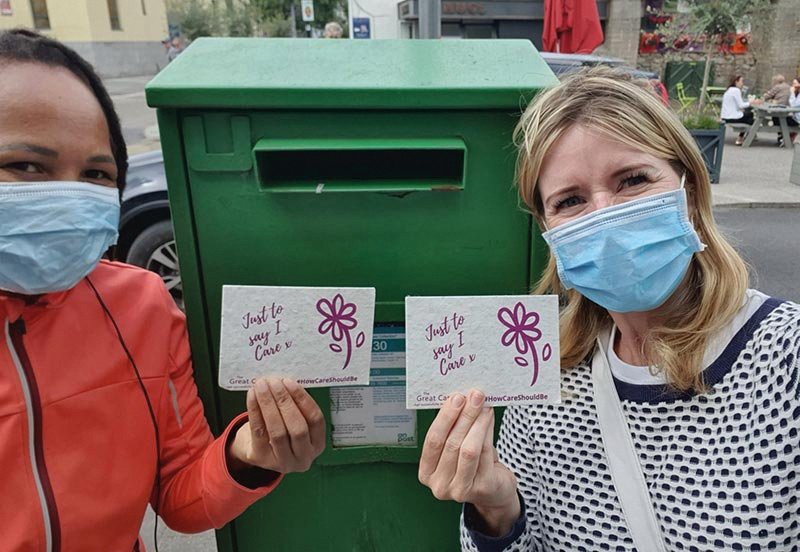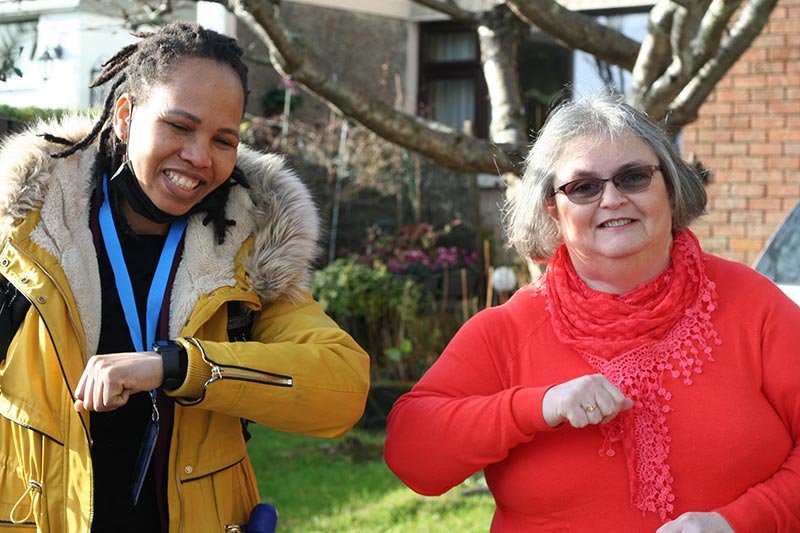A co-op is pioneering a new model of home care in Ireland, bringing together worker ownership and neighbourhood care in its mission to deliver “great care and great jobs”.
One of the Great Care Co-op’s home care assistants, Honora Doyle, has been with the co-operative for around three years, but her life as a carer started much earlier than that.
“I’ve been caring all my life – it’s just running through my veins, to be honest,” says Honora, who has previously worked in childcare, at a nursing home, and as a carer for both of her parents.
Inspired by the home care assistant who helped look after her dad, Honora found a job with a private home care company.
“In the beginning, it was amazing,” she says. “They were predominantly doing private care at the start. But then they got the tender to deliver care to public patients, and things got out of control. They just grabbed every client that they possibly could – but they didn’t have the number of carers to match it.
“So my hours were starting at like eight in the morning, and not finishing until 10 at night. And that’d be at least four days a week, maybe five, and working every second weekend.”
Honora’s experience is not unusual, with a recent report on home care in Ireland finding that the practices of for-profit care companies are “more likely to result in poor pay and conditions, precarious contracts, low levels of job satisfaction, stress and burnout”.
Despite the conditions she was now working under, Honora spent a decade with the company due to the bonds she had built with her clients. But as her health started to deteriorate, Honora says, she had to find another option.

After a particularly stressful week, Honora found herself in tears at a friend’s house. Her friend pushed her to get in touch with the Great Care Co-op (GCC), which was recruiting in her town of Dalkey.
“[My friend] said, ‘I know you love your clients, but you’ve got to do something, because you’re at breaking point’ – which I was.”
Honora rang the GCC and one of the co-op’s founders, Aoife Smith, answered. When Aoife first explained to Honora how the GCC worked, Honora was “blown away”.
As a worker-owned business, the GCC is led by its carers, who sit on the co-op’s board and various committees, making top-level decisions about the activities and direction of the organisation. At the same time, the GCC is organised into a decentralised system of local hubs, where decisions are made on the ground by carers and their teams without the need for micromanagement from above. The system is modelled on a Netherlands-based social enterprise called Buurtzorg (Dutch for ‘neighbourhood care’).
The Buurtzorg model focuses on giving power and autonomy to workers in order to deliver better care, which “fitted in quite well with the democratic worker co-operative model”, says Aoife. “It was a good evolution. So we’ve married the two of those together to bring something relatively new to the Irish market.”
Aoife met the GCC’s other founding members through her work at Migrant Rights Centre Ireland (MRCI).
“As home care became a huge growth industry in about 2005, 2006, a lot of the people in our domestic workers action group went and got their training to become carers, thinking that this was career progression. But they ended up coming back and saying, ‘Listen, the terms and conditions of employment are really, really bad’.

“All care workers are treated badly, but migrant women are treated the worst. So they were battling not just with discrimination based on their employment and their gender, but also triple discrimination based on their migration status.”
Based on this understanding of the system, the GCC’s founders wanted to create an alternative that centred the rights not only of workers, but of migrant workers and women, as well as those receiving care and their families.
“We believe that great care and great jobs are intrinsically linked, that the two shouldn’t be separated – you can’t have great care if you don’t have great jobs, and if you don’t have great jobs, then the chances are you’re probably not going to get great care.”
The GCC offers workers a higher than average hourly rate, paid mileage and travel pay, sick pay, and 5% pension contributions, which Honora says is “unheard of” in other home care companies.
Honora says that when she first learned about the GCC and how it works, she couldn’t believe it. “I kept saying, ‘are you sure you do this? Are you sure this is the way it is?’ But [Aoife] said ‘yes’. She sent me an application form, I filled it out, the following Wednesday I had an interview, and the next day I had a job.”
Honora now sits on the GCC’s board and chairs its quality and safety committee. “It’s lovely to see and watch how this thing grows,” she says, “and the engine that makes it run, and having a say in all that.”
But the biggest difference for Honora is “the fact that you’re listened to. I wasn’t when I was with the other company, I was a nobody. We weren’t allowed to have contact with our colleagues, we weren’t allowed to share phone numbers. The clients weren’t allowed to have our numbers. It was just ridiculous.”
The GCC holds fortnightly team meetings, where all workers are encouraged to have a say, and they stay connected and develop their relationships through quarterly work socials, paid for by the co-op.
The impact of these different working practices can be seen in a number of ways.
The difference between GCC and private care providers is shown by feedback from families of those receiving care, who say they have more confidence in the co-op than the company they previously used.
One family member said: “This problem of no-shows has never happened with the Great Care Co-op. If our carer cannot make it then somebody else shows up. I have never been let down by the Great Care Co-operative. It is a really reliable service.”
Another client’s family member highlighted the relationship they were able to build with their carer.
“We got to know the carers. One of the carers noticed that he was unsteady while using a stick and recommended the use of a rollator. They provided great support. The carers provided great emotional support to me as we could talk about how he was doing.
“We were very fond of [the carer]. Indeed, she became a close friend, visiting him in hospital and attending his funeral.”
The GCC’s operations manager, Frank Kelly, explains that the co-operative has built up a reputation for reliability.
“We’re really well known for not cancelling calls, and for being on time. These things are really important to us. They’re important to our clients, but deliverables for us, because we’ve collectively made that decision together.”
As operations manager, Frank’s role would normally be “messy”, involving “lots and lots of calls and people struggling with things”. But at the GCC, he says, “I don’t get calls … That says a lot, because carers themselves collectively make decisions locally, in their own care teams, and they normally can solve problems … When we allow that to happen, the carers then are making decisions quicker and have a more positive effect on each other for the clients.”
Frank also describes the GCC carers as often going “above and beyond what would be required. But they do that because wages are better, educational opportunities are better, and we offer them a career.”
An example of this can be seen in a recent trip organised by GCC, where carers took more than 20 clients to Dalkey Castle & Heritage Centre. The group watched a film about Dalkey’s history and spent time with Living History performers from the local theatre company.
“It’s sometimes very hard to get people with dementia or Alzheimer’s to actually concentrate or to watch,” says Honora. “They were totally enthralled. It was amazing to see. I was chuffed with myself, that we can do that for our clients.”
The GCC currently employs 27 carers and five office staff, serving around 70 clients across its three care hubs. By the end of 2026 it aims to add six more teams and increase its staff to 70, with hopes to go national between 2027 and 2030.
Despite these ambitions, the GCC is keen for growth to come in a sustainable way.
“We don’t want to grow just for the sake of growing,” says Frank, insisting that the co-op will not move on to another area until “we’ve hit that mission of great care and great jobs…If we’re not, then we double down on that, to get that right”.
This has implications not just for the future of the GCC, but for the wider care sector. The GCC featured in a report published earlier this year by researchers at the University of Cork, who identified the co-operative as an organisation that is “developing building blocks for a reformed and desirable system, one that appropriately values and rewards care”.
The report’s authors, Carol Power and Caroline Crowley, make a number of recommendations in response to the need for a “root-and-branch transformation of home care provision”, including developing a supportive ecosystem for care co-ops and a state-funded pilot programme to co-design and develop prototypes of community-led care.
The Irish government recently established an independent Commission on Care for Older People, which will make recommendations to the government on future strategy. This presents “a key opportunity to introduce care co-operatives to this dialogue and onto the policy agenda”, says the report.
At the grassroots, this dialogue appears to be happening already – since the publication of the report, Carol has received enquiries from people interested in setting up care co-ops in their own communities.
Aoife also sees potential for the growth of more independent co-operatives across the country’s care sector.
“If we can scale this out, and we believe it is scalable, there’s something here,” she says. “This is a systemic change approach. I think co-operatives have a huge potential to drive change in home care.”

